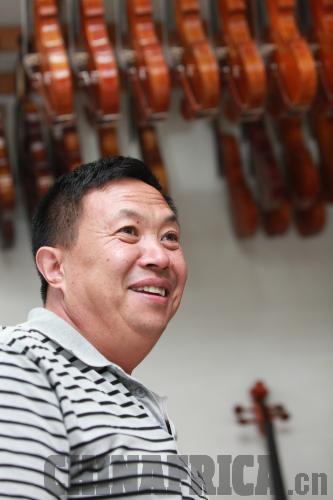|
 |
|
Geng Guosheng (YANG JIA) |
It looks like a typical northern China farmyard, rectangular in shape and with several bungalows and grey brick walls. One of the 150 violin making workshops in Donggaocun Town, northeast Beijing. The seemingly ordinary farmyard can have an annual output of violins worth over 1 million yuan ($157,000).
The owner of the workshop is Geng Guosheng, 50, an ordinary villager in Donggaocun, currently the largest violin-making base in China. Unlike other larger violin making businesses, Geng has a niche market. "I only make high-quality violins," Geng told ChinAfrica. Violins produced by larger factories are mainly used as practice instruments and sell at 100 yuan ($15.7) to 200 yuan ($31.4), while those made by Geng can sell at the price between 10,000 yuan ($1,570), and 100,000 yuan ($15,700).
Less is more
The biggest production Geng's workshop ever yielded was 2,000 units, requiring about 20 workers. To improve the violins' quality, Geng cut production to 100 and reduced its employees to seven. "In spite of the decrease in production, my workshop makes more profits now. And workers' salaries are double those in larger factories, about 3,000 ($471) to 4,000 yuan ($628) per month," Geng said. He has no plan to expand the output and will continue to make his high-quality violins in the future.
Geng has a positive and determined attitude toward life. In the late 1980s when local farmers began to make violins, he took the first step in this trade with confidence, despite his family not being very supportive at first. For Geng, who had been obsessed with carpentry since childhood, making violins came naturally and for his first instrument he disassembled a violin and after close observation, successfully made a similar one through the process of imitation. To his surprise, it sold for 500 yuan ($78.5), then the total annual income for a farmer. Twenty years later, the family is still engaged in violin making.
Quality control
After years of research, Geng became more skillful in this craftsmanship, developing his own ideas on how to create his masterpieces. According to him, the most important thing is to have the best wood, which should be air-dried and preserved as long as possible. "Only using such wood could we make high-class instruments with perfect acoustic fidelity," said Geng.
In this farmyard, stacks of wood having been stored for years, some for decades, were all in neat order. Geng spent almost all of his savings on wood as he was well aware that it determined the quality of the violins.
Besides the correct raw material, superb craftsmanship is also essential in making a good violin. For example, larger manufacturers used chemical glues, but Geng's workshop only uses those made from natural materials. No glues are used on the second day after they were made. "Re-using the glues will greatly degrade the quality of the finished violin," said Geng. It was because of such strict quality control that Geng is so confident of his instruments and promises to accept the return of violins within a one month period.
The perfect violin
Geng hopes the knowledge and the craftsmanship gained during the past years could be passed down to his only son, so that the business will be carried forward. However, his son, Geng Jia, is more interested with computers and the Internet. "Maybe he is too young," said Geng Guosheng.
Geng has few regrets. The business is thriving and his lifestyle and that of his family has improved immeasurably. One regret he does have, however, is that he hasn't yet made a violin to fully satisfy himself as a craftsman. Although he now only makes three to five violins every year and has enough time to focus on the elaborate detail of each piece, he still feels there is a long road ahead to craft the perfect instrument. "Nevertheless, I will strive [to make] the perfect one," said Geng. |